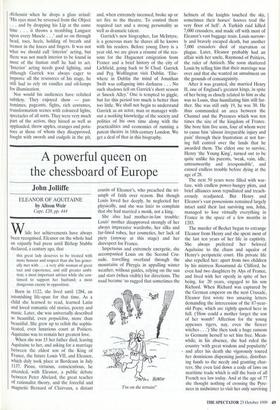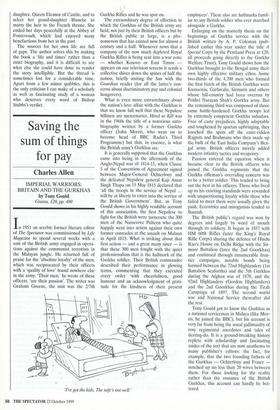A powerful queen on the chessboard of Europe
John Jolliffe
ELEANOR OF AQUITAINE by Alison Weir Cape, £20, pp. 444
While her achievements have always been recognised, Eleanor on the whole had an unjustly bad press until Bishop Stubbs declared, a century ago, that
this great lady deserves to be treated with more honour and respect than she has gener- ally met with .. . a very able woman of great tact and experience, and still greater ambi- tion; a most important adviser while she con- tinued to support her husband; a most dangerous enemy in opposition.
Born in 1122, she lived until 1204, an astonishing life-span for that time. As a child she learned to read, learned Latin and loved romantic old stories, poetry and music. Later, she was universally described as beautiful, even perpulchra, more than beautiful. She grew up to relish the sophis- ticated, even luxurious court at Poitiers. Aquitaine was to remain her greatest love.
When she was 15 her father died, leaving Aquitaine to her, and asking for a marriage between the eldest son of the King of France, the future Louis VII, and Eleanor, which duly took place at Bordeaux in July 1137. Pious, virtuous, conscientious, he attended, with Eleanor, a public debate between Peter Abelard, the great teacher of rationalist theory, and the forceful and magnetic Bernard of Clairvaux, a distant cousin of Eleanor's, who preached the tri- umph of faith over reason. But though Louis loved her deeply, he neglected her physically, and she was later to complain that she had married a monk, not a king.
She also had mother-in-law trouble: Louis' mother disapproved strongly of her always impressive wardrobe, her silks and fur-lined robes, her cosmetics, her lack of piety (anyway at this stage) and her disrespect for France.
Impetuous and extremely energetic, she accompanied Louis on the Second Cru- sade, travelling overland through the mountains of Phrygia in appalling winter weather, without guides, relying on the sun and stars (when visible) for directions. The road became 'so rugged that sometimes the 'I'm on the terrain!' helmets of the knights touched the sky, sometimes their horses' hooves trod the very floor of hell'. A Turkish raid killed 7,000 crusaders, and made off with most of Eleanor's vast baggage train. Louis narrow- ly and bravely escaped death, but another 7,000 crusaders died of starvation or plague. Later, Eleanor probably had an affair with her uncle, Raymond of Poitiers, the ruler of Antioch. She soon shattered Louis by telling him that their marriage was over and that she wanted an annulment on the grounds of consanguinity.
After it was granted, she married Henry II, one of England's greatest kings, in spite of her being as closely related to him as she was to Louis, thus humiliating him still fur- ther. She was still only 19, he was 30. He thus commanded an area between the Channel and the Pyrenees which was ten times the size of the kingdom of France. She bore him five sons, four of whom were to cause him 'almost irreparable injury and pain' through their frustration at not hav- ing full control over the lands that he awarded them. The eldest one to survive, Henry 'the Young King', turned out to be quite unlike his parents, 'weak, vain, idle, untrustworthy and irresponsible', and caused endless trouble before dying at the age of 28.
The next 50 years were filled with war- fare, with endless power-hungry plots, and brief alliances soon repudiated and treach- erously readjusted. But Henry and Eleanor's vast possessions remained largely intact until their last surviving son, John, managed to lose virtually everything in France in the space of a few months in 1203.
The murder of Becket began to estrange Eleanor from Henry and she spent most of the last ten years of her life in captivity. She always preferred her beloved Aquitaine to the chaos and squalor of Henry's peripatetic court. His private life also repelled her: apart from two children by his mistress Rosamund de Clifford, he even had two daughters by Alys of France, and lived with her openly in spite of her being, for 20 years, engaged to his son Richard. When Richard was captured by the German emperor on the next Crusade, Eleanor first wrote two amazing letters demanding the intercession of the 87-year- old Pope, which are rightly quoted here in full. ('How could a mother forget the son of her womb? Affection for the young appeases tigers, nay, even the fiercer witches .. .') She then took a huge ransom to Germany herself to set him free. Mean- while, in his absence, she had ruled the country 'with great wisdom and popularity' - and after his death she vigorously toured her dominions dispensing justice, distribut- ing funds to the needy and granting char- ters. She even laid down a code of laws on maritime trade which is still the basis of all French sea law today. And at the age of 77 she thought nothing of crossing the Pyre- nees in midwinter to visit her only surviving daughter, Queen Eleanor of Castile, and to select her grand-daughter Blanche to marry the heir to the French throne. She ended her days peacefully at the Abbey of Fontevrault, which had enjoyed many benefactions from her in the past.
The sources for her own life are full of gaps. The author solves this by making the book a 'life and times' rather than a strict biography, and it is difficult to see what else she could have done to render the story intelligible. But the thread is sometimes lost for a considerable time. Apart from a few minor quibbles, this is the only criticism I can make of a scholarly as well as fascinating study of a woman who deserves every word of Bishop Stubbs's verdict.



















































































 Previous page
Previous page